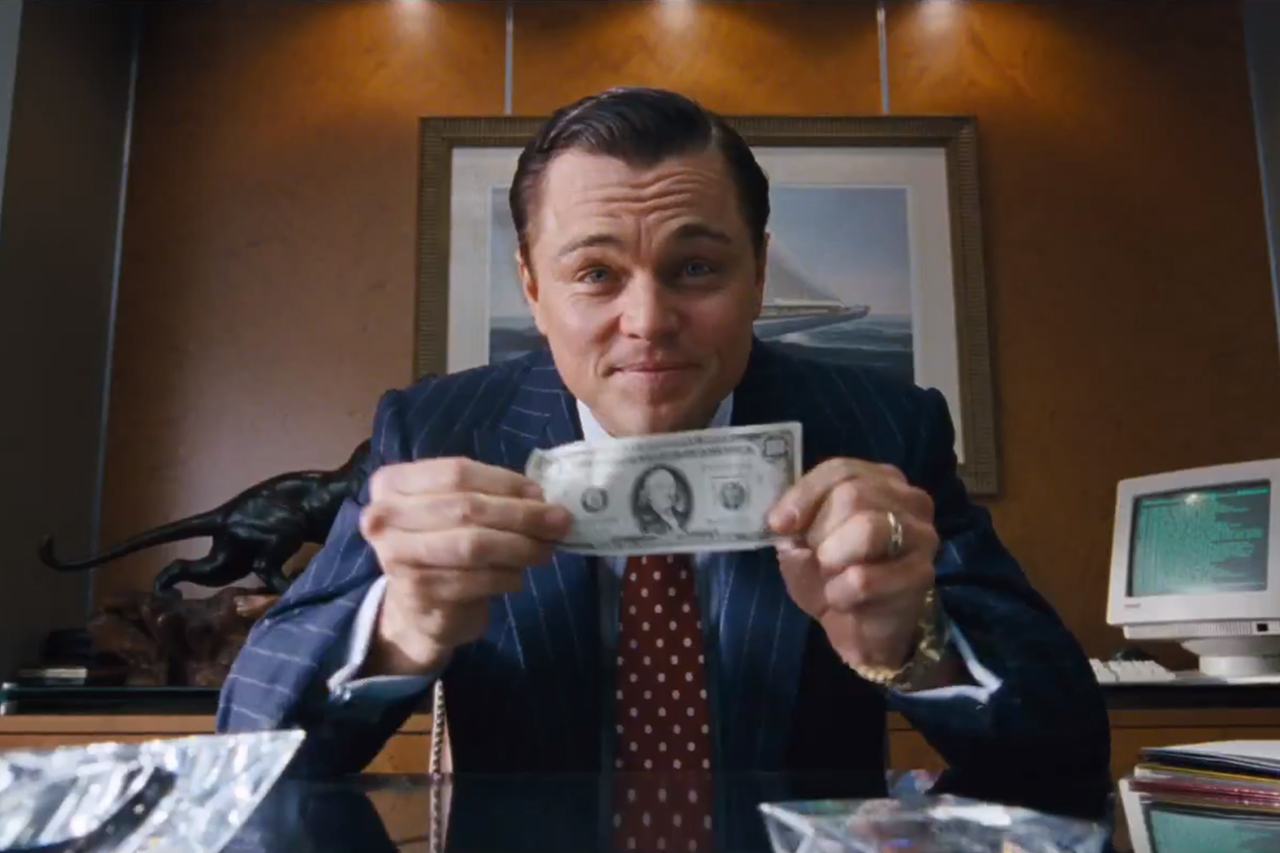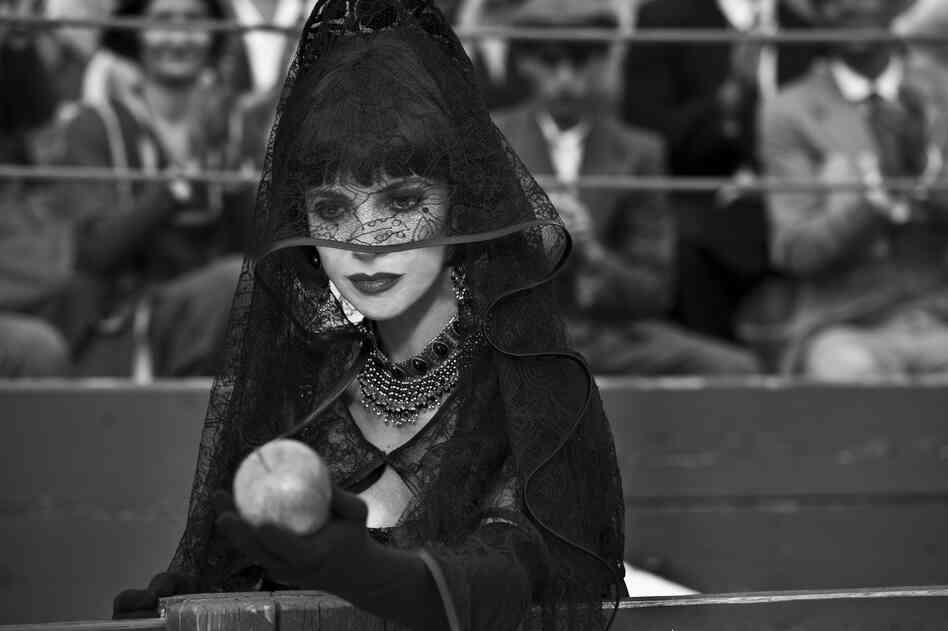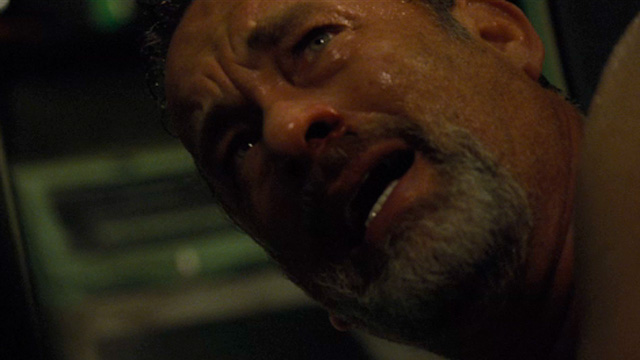Rating: 4/4
Belfort, as the beginning of movie informs us, started out as a not-so-depraved (but still determinedly greedy) underling on Wall Street shortly before the Black Monday crash of 1987. While the crash does cause him to lose his job at one of the big-time firms, he's there just long enough for Matthew McConaughey to instill in him the basic principles of being an effective stock broker; regular alcohol intake, frequent service by prostitutes, and most importantly, lots and lots of crack, to keep one "sharp between the ears."
With these Holy Commandments inscribed in this mind, Belfort decides to remake himself and build his way back up by using his white-collar selling skills to sell so-called "penny stocks," cheap stocks for mostly doomed companies that only those with absolutely no financial understanding whatsoever could ever be convinced to buy. He recruits his own team of amateur salesmen, people he can remake in his image, starting with Donnie, played with gusto by Jonah Hill, a man who becomes even more brutally depraved than Belfort (if that's even possible). Before long, their lives are one long stream of financial crimes, fancy clothes and cars, prostitutes, drugs, more prostitutes, and more drugs, continuing almost unbroken throughout the entire film, until a determined FBI agent nabs Belfort and most of his original team, bringing both them and the company as a whole crashing to the ground.
I suppose saying that constitutes a spoiler of sorts, but in this case, I think it's justified, because a) even though Belfort's story is a more obscure piece of economic history, it's part of public record, and b) the movie really isn't about the story or plot any more than it's about the clothes Hill and DiCaprio wear. This is a film built solely around recreating for the uninitiated the worldview of the addict, and getting its viewers into a mindset where extensive property damage, staggering levels of drugs and sex, unending domestic abuse, callous disregard for average folks, and needlessly-complicated money laundering schemes are commonplace, almost daily occurrences. And it succeeds, to a painfully dizzying degree.
The running time and the film's appropriately obsessive determination to make us feel every high, every crash, and every successful rip-off of some poor working-class schlub makes for a grueling and exhausting experience- by the end, I felt as thoroughly worn out as DiCaprio looks- but it works to a remarkably successful degree. It's almost as if Scorsese took a second look at his last work about a former criminal neither repentant nor ashamed of his actions (Goodfellas) and thought, "You know, I think I can do one better on that." Part of this is due its filming and editing style, as fascinatingly cluttered and hectic as the loud, physically exuberant rapid-fire environment of a broker office. Or as Belfort refers to it during the opening, "the sound of money."
For all his immense and deservedly legendary talents (all of which are on full display from start to finish), Scorsese can only get half credit here, as his energy is matched beat for beat by one of the year's stand-out lead performances and ensemble cast. DiCaprio has rarely been better in his career, and if he were in a less-crowded Best Actor category, this is the role that would finally win him his Oscar gold. And I think it's also safe to say that we can put to bed any lingering doubts that Jonah Hill's nomination for Moneyball a few years back was a fluke. Individually, each are fascinatingly disgusting parodies of many of humanity's worst traits. Together, they are a veritable whirlwind of insane destruction, leaving very little unbroken in their wake.
Like those who insisted that last year's Zero Dark Thirty endorsed torture, and that Django Unchained was racist, a fair few have attacked this movie for failing to more overtly and blatantly condemn the crimes of Belfort and his associates. And, just like last year, my response is if that is what you honestly think after seeing the film, you just didn't look hard enough. To tie this review back to my "subtlety" comment above, even when the movie's disgust with its subject is largely unspoken, it is still there. Halfway through the film, Belfort dumps his high school sweetheart for a trophy wife, spending scenes describing his addiction to her body and detailing how his sex-filled bachelor party cost him millions upon millions of dollars, not to mention the fairy-tale wedding they had right afterwards, and once all that fades away, what do we see in the next scene? The two of them screaming at each other 18 months later, which Belfort says had already become their morning ritual. All that money, all those drugs, all that sex, and all those material riches, and the only thing it brings him is obscenities, hurled at him by the one person supposed to be closer to him than anyone else in the world. If that is not enough of a commentary on the sad nature of such a life, then I ask you, what is?
Furthermore, and herein lies the true twist of brilliance in the film, it points blame in two directions at once; the one at Belfort, for the very real crimes he committed, and the other, at us, the audience. We are repulsed by Belfort, yes, and we are quick to condemn his drug abuse, or the fact that he hits his wife, but we also can't (or rather, we shouldn't) ignore the fact that we enable him and everyone else like him. The final shot of the film- the very last thing we see- is not Belfort lying broken in a ditch, or in jail, or weeping in shame. We see ourselves- another audience, staring at him with rapt attention as he teaches them how to sell. We created a world where he could exist, where other like him could thrive. And the scariest thing is when the movie ends, and you realize that between then and now, nothing's changed.
History does not happen in a bubble. The crash that set up Belfort's path happened in the 80's. His scheme came to light in the 90's. And just 15 years or so later, the exact same sort of aggressively greedy characters- people who maybe don't do as many drugs or screw as many prostitutes as the film's Belfort does, but who have the same juvenile, male drive on autopilot- were left free to work their devious magic again, with results even more far-reaching and tragic. And as of right now, it's only a matter of time before it happens again, because, again like Belfort, those responsible the last time around were never brought to task. Never made to feel the pain they'd inflicted on so many others. And it's that brutal reality that Wolf brings home so effectively. It's three full hours of the male id on overdrive, and it's because of how well it does that, not in spite of it, that The Wolf of Wall Street is one of the best movies of the year.
So take a good look, people. Set an evening aside in the near future to watch Wolf of Wall Street. Pay close attention to it. These are the people we worship as exemplars of working hard to achieve the American dream. These are the much-lauded "job-creators" we apparently can't live without. These are the men (emphasis on men) to whom we have granted custody over our financial and economic health. These are the people our politicians don't dare offend with higher taxes. Are you pleased with our choice?
-Noah Franc










